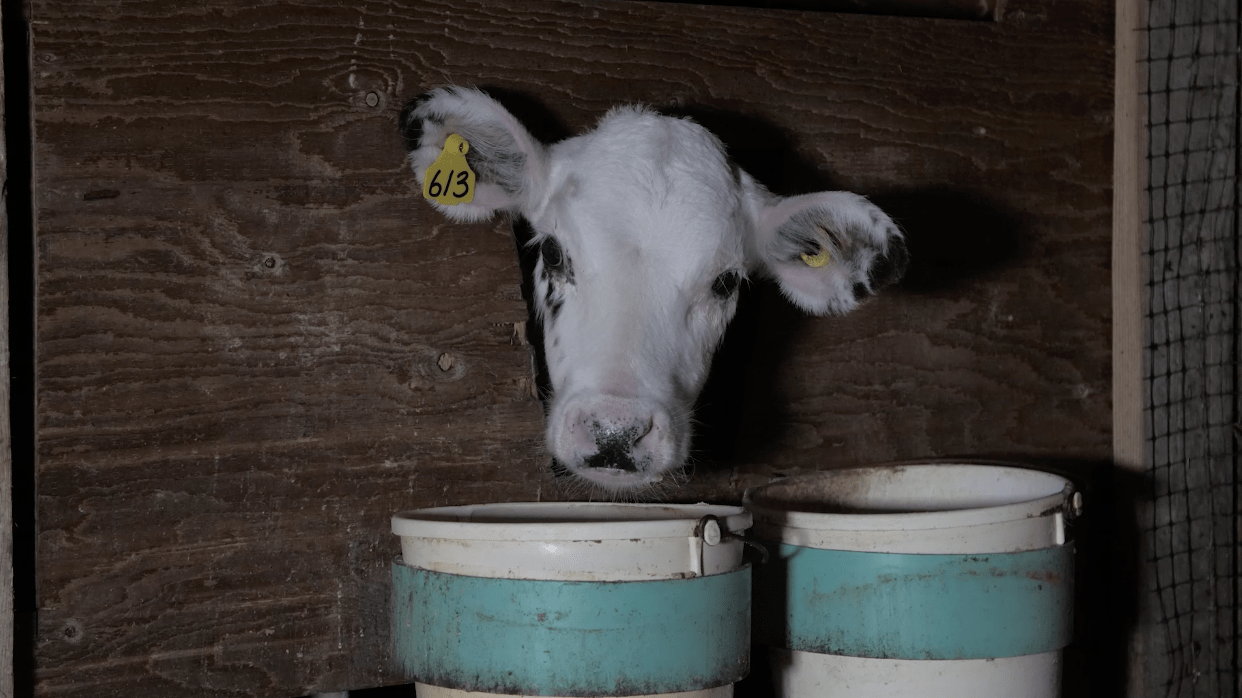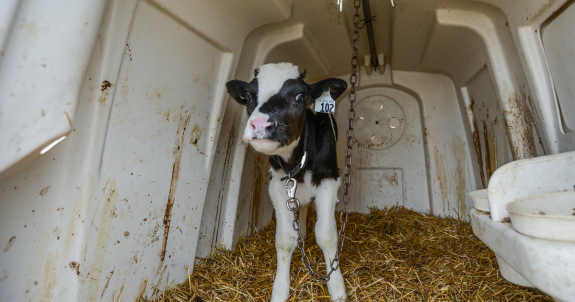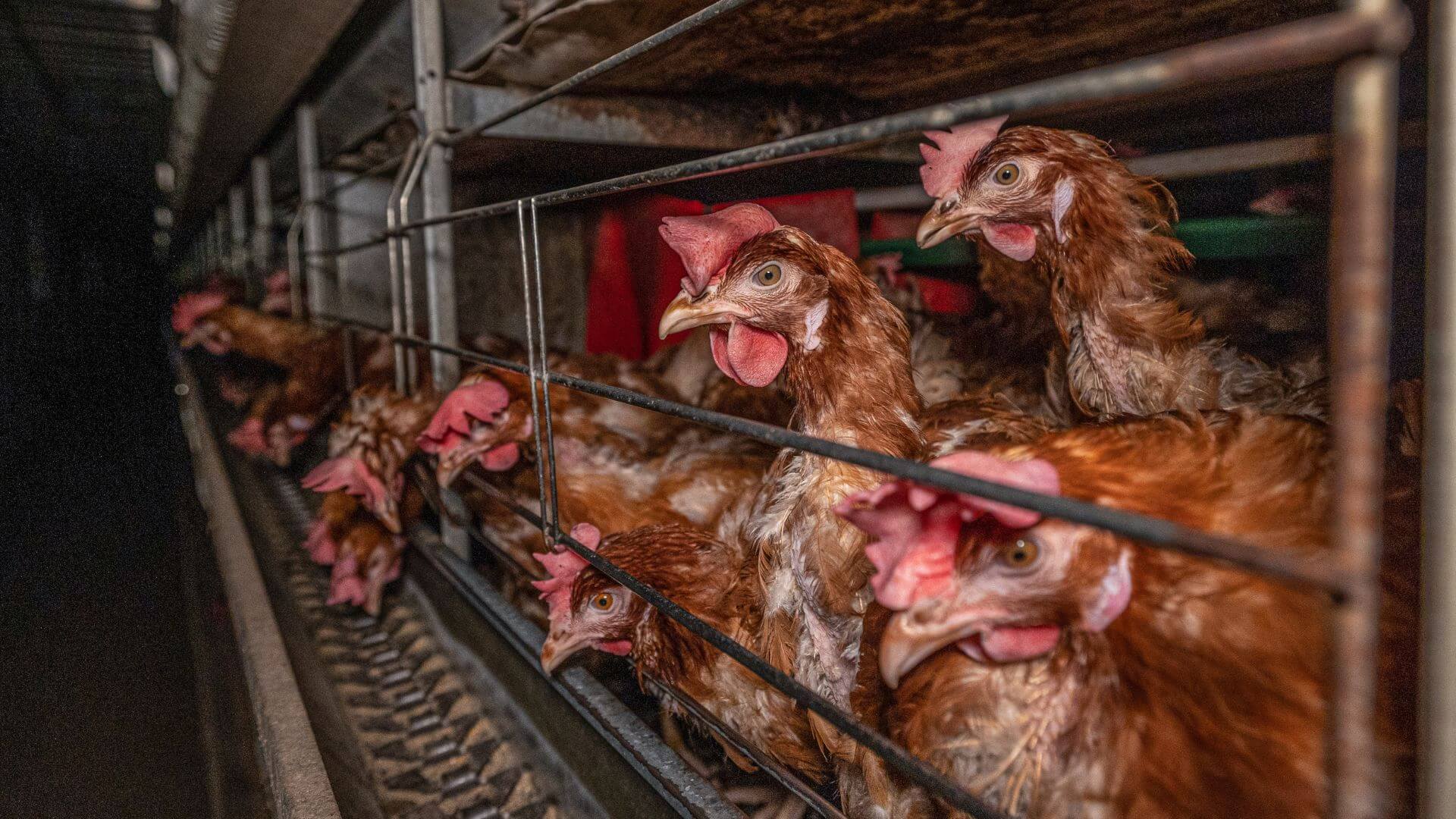Cows are incredible animals. Cows are complex, social beings who form close bonds with their babies and others in their herd, have excellent memories, and love to play.
Tragically, cows endure heartbreaking cruelty in the dairy industry. Cows are artificially inseminated to force them to give birth and lactate. When a cow gives birth in the dairy industry, her baby is permanently taken away from her, causing severe distress to her and her calf. After cows used for dairy are so depleted that their productivity declines, they are shipped to slaughter at just a fraction of their natural age.
Numerous undercover exposés show that abuse is rampant in the industry, including hidden-camera footage released by Animal Justice from an organic dairy farm in British Columbia.
Male Calves Killed for Veal
Within hours after birth, calves born in the dairy industry are removed from their mothers and kept confined in crates or hutches. While many female calves are kept alone in hutches on dairy farms, destined to endure the same cycle of suffering as their mother, male calves face a separate tragic fate. Male calves in the dairy industry are slaughtered for meat and sold as veal.
Calves in the dairy and veal industries are commonly forced to live alone in tiny hutches for their first 8 weeks of life or even longer, depending on the type of farm. Industry guidelines do not even require calves in hutches on dairy farms to have access to physical contact with other calves. Many are still kept tethered – a cruel practice that has been banned in other jurisdictions. The ability to interact with other animals is crucial to the well-being of these newborns who have been removed from their mothers.
Calves in the dairy and veal industries are subject to painful procedures such as disbudding, dehorning, and castration. Time and time again, undercover exposés have shown violent abuse of calves on farms.
Calves raised for veal often suffer from arthritis, respiratory diseases, diarrhea, and ear infections. When they are kept in a barren environment, they can also experience severe psychological distress leading to abnormal repetitive behaviours such as biting at the bars of their hutches, acting lethargic, or rolling their tongues. The majority of calves raised for veal are slaughtered at under twenty weeks old.

The Veal Industry in Canada
Canada lacks legally binding standards of care to protect the health and well-being of animals on farms. In the absence of legally binding standards, governments tend to turn to industry guidelines to determine whether animal suffering is exempt from provincial animal cruelty laws. Allowing the veal industry to make up its own standards of care is completely unacceptable and leaves vulnerable animals at risk of extreme physical and psychological suffering.
According to the federal government’s “Quick Facts 2022” for the beef and veal industries:
- 12.29 million cows, including calves, are kept on 73,085 farms and ranches in Canada (as of July 1, 2022).
- Alberta accounts for approximately 40% of Canada’s beef and veal products.
- 3.5 million cows and 204,150 calves were slaughtered in federally and provincially inspected slaughterhouses.
- 1.38 million tonnes of beef and 33,560 tonnes of veal were produced in 2022.
What Can You Do?
The veal industry condones heartbreaking cruelty and causes calves to suffer both physically and mentally. Don’t support the meat and dairy industries—simply choose to eat plant-based meals instead. Together, we can help foster a more compassionate food system.
Banner: Jo-Anne McArthur | We Animals Media



